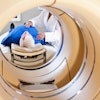A new cardiac radiopharmaceutical being developed by GE Healthcare of Chalfont St. Giles, U.K., is showing an ability to predict cardiac events in symptomatic heart failure patients, according to results published in the May 18 issue of the Journal of the American College of Cardiology.
The ADMIRE-HF (AdreView Myocardial Imaging for Risk Evaluation in Heart Failure) prospective study used iobenguane I-123 (AdreView) to indicate that there are four independent variables that contribute to the prediction of primary cardiac outcome events.
Study co-author Dr. Roxy Senior, director of cardiac research at Northwick Park Hospital in London, said increased cardiac sympathetic activity is a prominent feature of heart failure and is associated with progressive deterioration and remodeling of the myocardium, inexorable decline in left ventricular function, and worsening symptoms.
The results suggest that in appropriately selected patients with heart failure, scanning with AdreView can alert clinicians to the potential need for considering additional treatments, he added.
ADMIRE-HF was conducted in 96 centers in North America and Europe and consisted of two identical open-label phase III clinical studies evaluating the cardiac sympathetic nerves at the cellular level.
In the trial, 964 patients with New York Heart Association (NYHA) class II (83%) and III (17%) heart failure (66% ischemic, 34% nonischemic) and left ventricular ejection fraction of 35% or less (mean, 27.1%; median, 29%) underwent early (15-minute) and late (four-hour) planar and SPECT myocardial imaging.
After some patients were excluded, the researchers were left with a population of 961 individuals who were observed every six to seven weeks over the course of two years to monitor for the occurrence of cardiac events. During the median follow-up period of 17 months, first cardiac events were observed in 237 patients (25%), which included 163 cases of heart failure progression, 50 arrhythmic events, and 24 cardiac deaths.
The risk of cardiac events was significantly lower for patients with a heart/mediastinum (H/M) ratio of 1.60 or greater, with a hazard ratio of 0.40 (97.5% confidence interval: 0.25 to 0.64; p < 0.001).
Survival analysis revealed two-year event rates of 15% for patients with an H/M of 1.60 or greater, compared with 38% for patients whose H/M was less than 1.60.
Related Reading
GE partners with CardioDx on diagnostics, May 13, 2010
GE's German IT unit chooses Matrox boards, May 12, 2010
GE begins 1st Optima MR450w installs, April 28, 2010
GE, Nycomed extend partnership, April 28, 2010
GE targets ultrasound energy reduction, April 26, 2010
Copyright © 2010 AuntMinnie.com

















